- Learning time
- 60 minutes
- First play time
- 150 minutes
Monumental
Designed by: Matthew Dunstan
Monumental is a civilisation game where players take on the identity of the fledgling Danes, Chinese, Japanese, Egyptians or Greeks and try to expand their power across a modular board of hexes – representing in game terms provinces that can be controlled by having your own units present. Why control them? Let’s start at the end.
In Monumental you score for four criteria: provinces controlled, knowledge gained (in the form of cards acquired) wonders built (-also cards) and cultural policies enacted (-cards!). Despite the big board and occasional scrap between players, Monumental is largely a card game that utilises deckbuilding: everyone starts with a basic set of cards and spends the game upgrading them.
Everyone starts by placing their pieces on a city tile that will always be yours: there is no player elimination here. You have a leader and nine soldiers that are all units to be wielded in order to gain control of provinces. You also have a couple of explorers who don’t fight but can share spaces and go around gathering resources for you – there are three basic resources (military, production, science) and gold, which serves as a ‘wild’ resource: it can represent any of the others. On your turn you’ll be claiming resources and spending them: in short, military allow you to move units and explorers around the board, production allows you to buy more (and better) cards, including Wonders, and Science lets you buy the blue Knowledge cards, the benefits of which we’ll come to shortly. (Science can also be spent to gain more actions – we’ll come to that too)
Understanding how you come by these resources requires you to turn your attention away from the main board and to your own ‘city’ – a grid of cards laid out 3×3 in front of you. On your turn you must choose both a column and row to activate, meaning that altogether five cards will activate. Mostly your starting cards simply award the aforementioned resources, but one or two cards have a special power, for instance getting you a gold or allowing you to remove a card from a game. Getting rid of these starting cards is good, because you’ll be spending production to buy better cards. When cards have been used they get discarded and you refill your city from your deck, but when the deck runs out the discards are shuffled to recreate it – so losing these starter cards means your upgraded cards come around more quickly.
The blue Knowledge cards have two benefits. One is that during the game they act like bonuses in your city: if you deal out a blue card you place the next card on top of it: you get to activate both of them. The other is that each Knowledge card is worth a point at the end of the game. Science can also be spent activating the top card of your deck – a bit of a gamble, but rather nice when it pays off.
The Wonders can be tricky to build – across two stages – but they not only bring two points each at the end of the game, but they function as part of your city and will activate like any other card. Be aware though that you need to control an empty province on the board in order to build one!
And the cultural policies are paid for with the hard-to-come-by currency of culture. Each policy gives you a bonus and an ongoing benefit – for instance, every time you take a province into your control, gain two military – but they get progressively more expensive, and each new policy supersedes the previous one.
So each turn is a juggle of these various possibilities and the routes to them, saddled by the fact that basic resources (usually) cannot be kept from turn to turn! If you don’t spend ’em, you lose ’em.
It’s worth talking a bit more about that shared board too. Each province has a defence value printed on it (between zero and three) and most also start off defended by barbarians that add to the defence value. To take control you need to move units into the province that exactly match the defence value: doing so rewards you with the barbarian token present: on the other side of it are two rewards, and you choose one for yourself. Some provinces require payment to take control of, in the form of gold, but the most difficult are often taking provinces from another player: this can be done, but they’re usually well-defended, especially if there is a Wonder present.
When the cards in the market – those available to buy – run out, the end of the game is triggered.
There is a booklet in the box offering various set-ups depending on the number of players, as well as a couple of expansions in the form of Leaders and Monsters.
The guru's verdict
-
Take That!
Take That!
Not as much as the gladiatorial box cover would have you believe. Players can and do fight over provinces, but it's not the main focus and tends to happen only toward the end of the game.
-
Fidget Factor!
Fidget Factor!
Moderate (early game) to high (endgame). Of course, some familiarity will help and some players will prefer playing in a freewheeling and less computational style. That'd be my preference too, but it's not something the game rewards.
-
Brain Burn!
Brain Burn!
Choosing a column/row is easy at the start, when all you're doing is generally gathering some resources to spend. As things ramp up there is the number of resources gained v how and what to spend them on, including cards and board movement, plus the special powers, plus wonders, plus cultural policies and not forgetting Leaders as well - each player's leader gives them a special ability throughout the game.
-
Again Again!
Again Again!
Lots of variety in the box including variable set-ups, expansions.

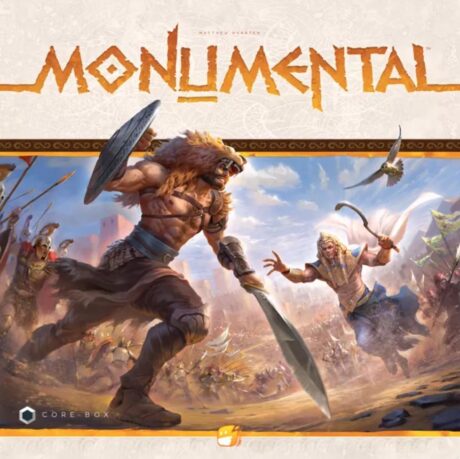
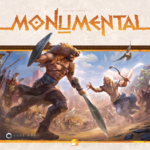
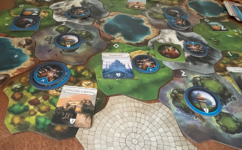
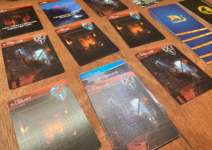
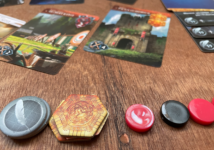
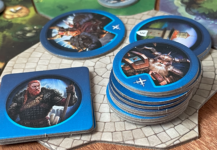



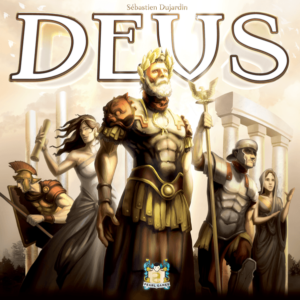

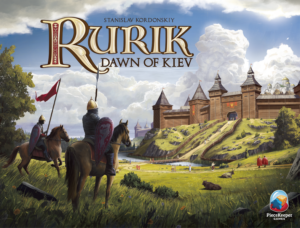
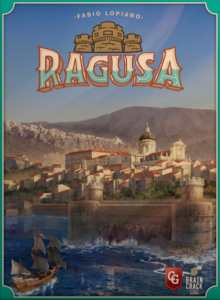
Sam says
I've really enjoyed a lot of this designer's games but I found Monumental a bit of a disappointment - probably in part because my expectations of a 'civilisation' games are quite different: a tangible narrative, a lot of direct interaction. With Monumental the shared space of the map feels like it's almost secondary to this abstract game of activating a row and column happening in front of you, and the problem I have with that is while each player's turn is undeniably engaging for them, these turns get longer and longer as the game goes on and they become more powerful but more computational; progressively convoluted, and narratively irrelevant. Is it fun? It's a fun puzzle of optimizing what's best for you, if that's a kind of fun you like. But while I'm taking my increasingly epic turns nobody else is doing anything, and the fact that two of the game's scoring criteria are independent from the shared board (Knowledge cards and Cultural Policies) makes it feel like it's - to my mind- too puzzly; too isolating, and simply too long. It's not a bad design, but to enjoy Monument you need to make your peace with the fact the 'down-time' will be considerable, and - unlike many civ games where other players actions have a lot of import - often almost irrelevant, because what the other players are focusing on is often a game that doesn't involve you at all.